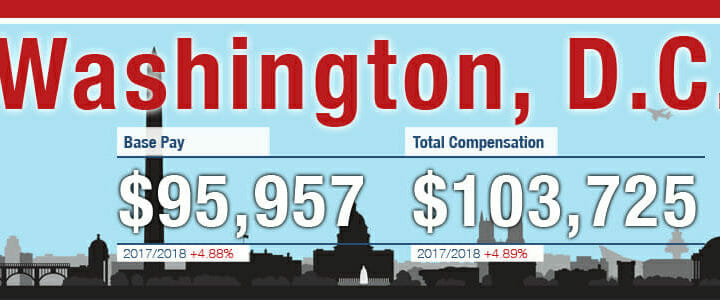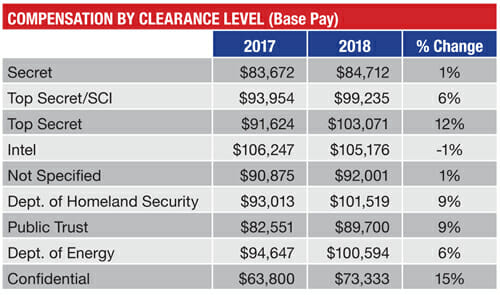The American economy is on the rebound; spending is up and jobs are being created. And though we’ve all heard the chants to “drain the swamp,” there has actually been an increase in government spending that has breathed new life into the once-stagnant job market in the defense sector.
According to the Bureau of Labor Statistics, the D.C. metropolitan area added 51,500 jobs in the one-year period that ended in June. This 1.6% growth rate exceeded the nation as a whole. Growth came from federal contractors, according to an analysis by the Stephen S. Fuller Institute at George Mason.
Unemployment rates in the D.C. area have also remained low: 5.6% in the District, 4.3% in Maryland and 3.2% in Virginia.
Washington, D.C. Salaries by clearance level
According to the 2018 ClearanceJobs Compensation Survey, D.C. had a mean base salary of $95,957 and a mean total compensation of $103,725 -second only to salaries in Virginia. However, salaries in Virginia, Maryland, and D.C. also had the lowest mean base pay increases in the nation, averaging 5% – pointing to a flattening effect of salaries in the D.C. metro area.
For those with Top Secret clearance the mean base pay increased by 12%, and the median base pay rose by 18%, indicating a high demand for Top Secret professionals. In addition, mean total compensation for those individuals increased 11% and median total compensation increased 17%.
In metro D.C., the career levels experiencing the highest pay and total compensation increases have been for senior-level careers and executives, with increases ranging from 7%-12%, while the base salary and total compensation for entry-level and early-career level professionals remained flat.
Mean base pay for full-scope polygraph also increased more than 4%, while the median rose more than 9%. There was also a 5% increase in median total compensation for full-scope polygraphs. Both mean and median base pay for counterintelligence polygraph holders increased by 5%.
How Northern Virginia Affects D.C.
Virginia is well known not only for its highly competitive job market, but is also generally seen as a great place to work, live, and for companies to do business.
“It has a long history of ranking in the top 5 in the country for best places for businesses,” said Lykia Law, senior recruiter at advanced technology company Sevatec.
“Northern Virginia in particular is an economic powerhouse, with its proximity to the federal government in Washington D.C., and the job market has benefited tremendously because of that geographic juxtaposition,” Law told ClearanceJobs. “Northern Virginia has attracted a highly educated workforce,is home to several top notch educational facilities, and has a very business-friendly climate and one of the largest groups of security-cleared, retired military veterans.”
This competitive neighbor to the south of the District may explain why D.C. cleared jobs and salaries are steady, but not booming.
What’s the forecast for capital spending?
Government spending is likely to pick up in the D.C. metro area and this should be good news for federal contractors. Maureen Stevens, a spokeswoman for defense contractor Raytheon, told The Washington Post that hiring has increased moderately as the company competes for new work in areas such as cybersecurity and operational command and control.
She noted that the company’s Intelligence, Information. and Services business unit, which employs about 3,000 people in the D.C. area serving defense and intelligence agencies, had hired over 300 people already by the spring. In 2017, it only hired 400 for the whole year.
“The job market is extremely tight, and it will be difficult to find workers, however,” added Andrew Bauer, economist with the Federal Reserve Bank of Richmond. “Security clearance adds a level of tightness, and the issue is where do you find the workers to fill the contracts. What we are seeing is very similar to the late 1990’s labor market when it was very tight in the government and contractor sectors.”
As a result salaries may continue to rise.
“We’ve seen bidding for some positions, especially in the IT sector,” added Bauer. “For some positions counter-offers are creating mini-bidding wars.”
This stiff competition means total compensation is up across the market, added Kari Van Curen, senior director of talent acquisition at BAE Systems, which has offices in Tysons Corner, Virginia.
“The market is incredibly tight here, and it is making it hard to find the right people,” Van Curen told ClearanceJobs. “We’re seeing that the commutes too are creating a challenge, and as a result we’re trying to be creative to get the right talent for our programs.”
Beyond salaries the entire compensation offerings are evolving, as well. “Base salaries are up, but there are other factors that go into salaries, and we’re looking at our options. Our goal is to customize the right package for our candidates and that can include providing support with tuition or repayment of loans in some cases.”
This article is one in a series based on the 2018 ClearanceJobs Compensation Survey. This survey was administered online between October 30, 2017 and February 9, 2018. Participants had to have a current, active federal security clearance and be currently employed to be included in the results, which included 20,883 usable responses.






